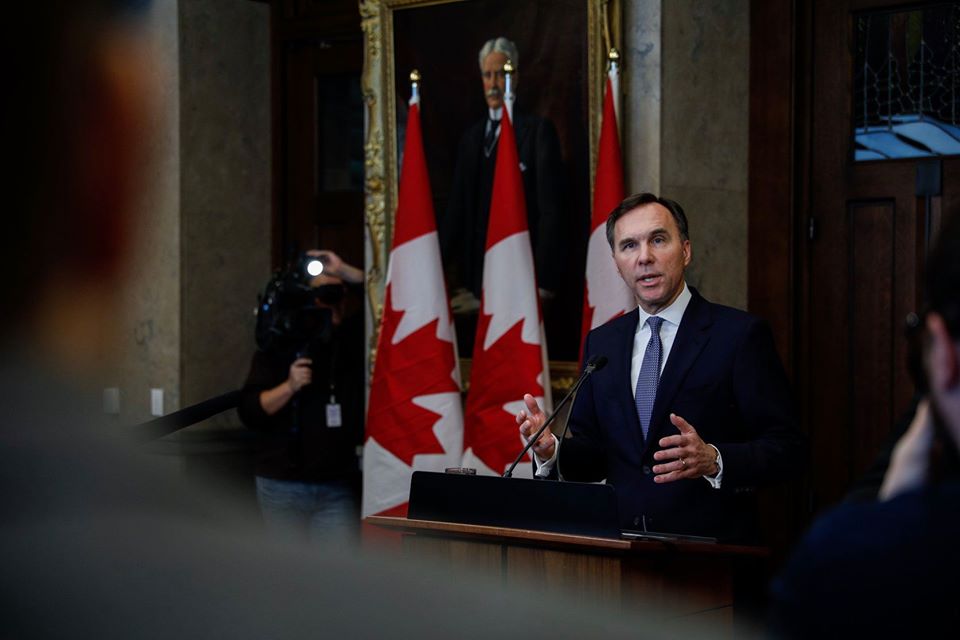Canada News
Government provides tariff relief to importers of certain medical goods

Today, Finance Minister, Bill Morneau, announced action to further ensure Canadians have access to personal protective equipment (PPE) and other necessary medical equipment. (File photo: Bill Morneau/Facebook)
The Government of Canada continues to take immediate, significant and decisive action to protect Canadians’ health and safety, and to support Canadian jobs and the economy during the COVID-19 pandemic.
Today, Finance Minister, Bill Morneau, announced action to further ensure Canadians have access to personal protective equipment (PPE) and other necessary medical equipment. To keep Canadians safe, the government is waiving tariffs on certain medical goods, including PPE such as masks and gloves. This will reduce the cost of imported PPE for Canadian businesses, which face tariffs of up to 18 per cent in some instances, help protect workers, and ensure our supply chains can keep functioning well.
This action complements the government’s ongoing efforts to increase domestic PPE production by Canadian industry. Tariff relief for these goods will remain in place for as long as necessary to deal with the COVID-19 crisis.
Today’s announcement is part of the Government of Canada’s COVID-19 Economic Response Plan – a comprehensive plan that is supporting Canadian workers and Canadian businesses, and ensuring Canada’s economy remains stable and ready to rebound when the time is right.
Quotes
“Our first priority is the health and safety of Canadians. By removing financial barriers, we’re making sure Canadians and Canadian businesses can access the critical medical goods they need during the COVID-19 crisis. Our government remains focused on making sure workers have the protective equipment they need, that our supply chains continue to work well, and that Canadians remain safe and healthy.”
– Bill Morneau, Minister of Finance
“We know that the demand for personal protective equipment will continue to be important through the next phases of this crisis. By working with procurement ministers across the country and members of our COVID-19 Supply Council, we are actively supporting front-line health care workers and all Canadians as the pandemic evolves, including by reducing barriers to access personal protective equipment.”
– Anita Anand, Minister of Public Services and Procurement
Quick facts
- While certain medical goods and equipment, including PPE, can be imported duty-free, some tariffs remain. Tariffs can be as high as 18 per cent and are a non-recoverable cost for importers.
- This measure builds on other relief from tariffs and sales taxes—starting March 16, 2020—for goods imported for emergency use by, or on behalf of, certain health-related entities, including hospitals, first-response organizations and care homes.
- Canada’s Plan to Mobilize Industry to fight COVID-19 is providing $50 million to help source PPE here at home and build domestic industrial capability needed to manufacture critical equipment.
- The National Research Council of Canada’s COVID-19 Challenge Program, composed of teams of government, academic and private sector partners, is addressing a range of medium term needs of the Public Health Agency of Canada and Health Canada, including PPE.
- The government has taken action to support Canadian businesses through the outbreak of COVID-19, with targeted new initiatives:
- The Canada Emergency Commercial Rent Assistance (CECRA) for small businesses, which will provide a forgivable loan to qualifying commercial property owners, who in turn give a rent reduction of at least 75 per cent for April and May (retroactive) and June to impacted small business tenants who have experienced at least a 70 per cent drop in pre-COVID-19 revenues.
- Launching the Canada Emergency Wage Subsidy (CEWS) calculator to support employers as they prepare to apply for the CEWS. On April 27, 2020, the Canada Revenue Agency launched the application process for the CEWS. The CEWS applies at a rate of 75 per cent of the first $58,700 normally earned by employees—representing a benefit of up to $847 per week, per employee. The program is in place for a 12-week period, from March 15 to June 6, 2020. Employers of all sizes and across all sectors of the economy are eligible, with certain exceptions.
- Providing support to businesses through the Business Development Bank of Canada (BDC) and Export Development Canada (EDC) under the Business Credit Availability Program (BCAP). As part of this program, EDC and BDC will provide direct lending and other types of financial support at market rates to otherwise viable businesses and organizations whose access to financing may be restricted. By working in close cooperation with financial institutions, this program is filling gaps in market access and leveraging additional lending by private sector institutions. Employers with a total payroll of $20,000 to $1.5 million in 2019 will also be eligible to access the Canada Emergency Business Account, which will provide interest-free, partially forgivable loans of up to $40,000 to small businesses, including not-for-profits.
- Allowing businesses, including self-employed individuals, to defer all Goods and Services Tax/Harmonized Sales Tax (GST/HST) payments, as well as customs duty payments owed for imports, until June. This measure is the equivalent of providing up to $30 billion in interest-free loans to Canadian businesses. It will help businesses so they can continue to pay their employees and their bills, and help ease cash-flow challenges across the country.
- Deferring the payment of income taxes. The government is allowing taxpayers to defer, until after August 31, 2020, the payment of income tax amounts that become owing on or after March 18 and before September 2020. This relief, amounting to $55 billion in liquidity support, would apply to new balances due, as well as instalments, under Part I of the Income Tax Act. No interest or penalties will accumulate on these amounts during this period.





















